Christina Harrington and Haley Winters binge-watched BoJack Horseman this week, and they’re ready to drop everything to convince you do the same.
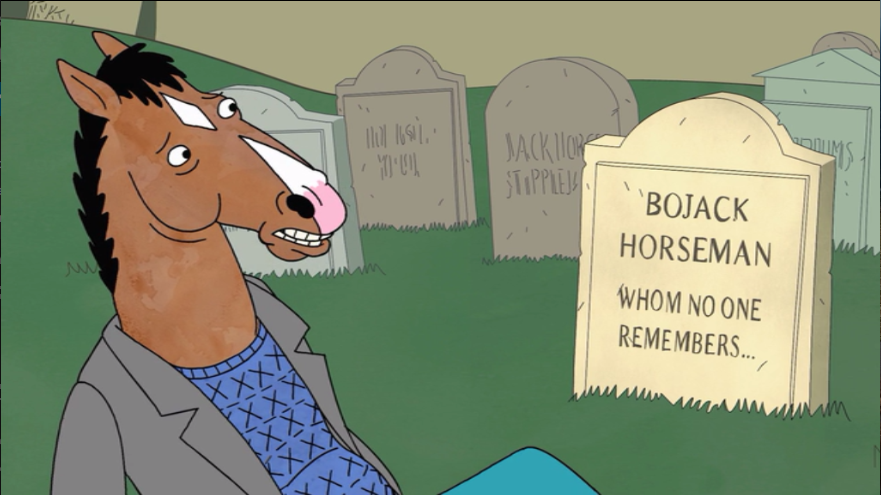
Haley: I thought I knew what to expect from BoJack Horseman, the Netflix original animated series about a washed-up nineties sitcom star who is also a horse. Even after the first few episodes, I thought I understood what I was getting into. It was wry, it was pop, it was a little irritating. It was Archer-lite with animal heads. And then I watched the rest of the season. And I was wrong. I was so wrong.
Christina: I honestly didn’t like BoJack Horseman all that much for the first three episodes. It pulled me in with the promise of a surreal and comedic animated show, like something out of Adult Swim, and those first few episodes didn’t live up to that promise. I thought the characters were shallow and the jokes unfunny and immature. But then episode four happened. And the entire thing changed into something new.
Haley: I really just want to skip ahead and talk about when the show started working, but I guess to really give this series a full review we should start at the beginning. So. The premise.
Christina: BoJack Horseman is a washed-up family sitcom actor from the early nineties who struggles with self-loathing, while also being one of the most narcissistic characters on television. He lives with his freeloading (and possibly only) friend, Todd (Aaron Paul), and exasperates his ex-and-also-agent Princess Carolyn (Amy Sedaris), who has hired a ghostwriter named Diane (Alison Brie) to finish penning his memoirs.
Haley: BoJack is voiced by Will Arnett, who I honestly think was the wrong choice for the character. We’ve been spoiled by two H. Jon Benjamin-led animated series, Archer and Bob’s Burgers, and Arnett’s gravelly monotone is so close to that aesthetic it’s hard not to wish the man himself had the role.
Christina: I was with you on the Arnett problem for the first half of the series, and it does feel like this was a project originally intended for H. Jon Benjamin, but I can’t help but feel like Arnett was the right person for the role by the end. The pathos and bittersweetness of those last two episodes really made Arnett’s casting choice seem right, and his acting was on point during BoJack’s worst moments, making this character truly sympathetic. Which is a feat in and of itself.
Haley: Even if I didn’t love all the main cast (Amy Sedaris, much as I like her, just rubbed me the wrong way as a pink feline Ari Gold), there were so many famous voices thrown into the mix throughout the season that I could hardly pinpoint them all–my hastily jotted list includes Stephen Colbert, J.K. Simmons, Anjelica Huston, Patton Oswalt, and Olivia Wilde.
Christina: One of my favorite performances in the entire show was from Paul F. Tompkins as Mr. Peanutbutter, an anthropomorphic dog that got his start in television in a show that’s eerily similar to the show that launched BoJack into stardom. Unlike BoJack, however, Mr. Peanutbutter has taken his fame much better and is a relatively positive person, albeit incredibly stupid. He’s a golden retriever through and through, if a golden retriever could wear v-neck t-shirts and then complain when the movie version of himself doesn’t wear v-neck t-shirts.
Haley: Mr. Peanutbutter is really a great example of one of my favorite parts of the show, which is the constant acknowledgment that these are animals living in a human world. He loves tennis balls and hates the mailman. Of course, anthropomorphic dogs have been done aplenty, but Bojack Horseman also treats us to Charlie the Treefrog who is a terrible assistant because his hands are too sticky, Gary the black sheep of his family who is actually a black sheep, and Quentin Tarantula (director of The Good, the Bad, and the Bugly) who manages to perform an entire slow clap sequence with his six hands.
Christina: I love that in the show’s world there are anthropomorphic animals living alongside normal humans, and there are often reveals about how this changes historical and pop cultural figures. When BoJack and Diane are visiting her family in Boston, they drive past a Paul Revere statue, and he’s riding a horse, but instead of a normal horse, we get one of the anthropomorphic kind, which is standing on its hind legs, arms crossed, wearing a suit. It’s a background moment that works both as a quick joke, and as a way to quietly build the world up around us. An important part of BoJack’s character is his love for Secretariat. We’re constantly and quietly reminded that Secretariat is BoJack’s childhood hero, so when it finally builds up to a big reveal in the last episode it resonates with us emotionally. The core of that emotion comes from the (obvious in retrospect) reveal that Secretariat, in this world, is an athlete who is mired in scandal.
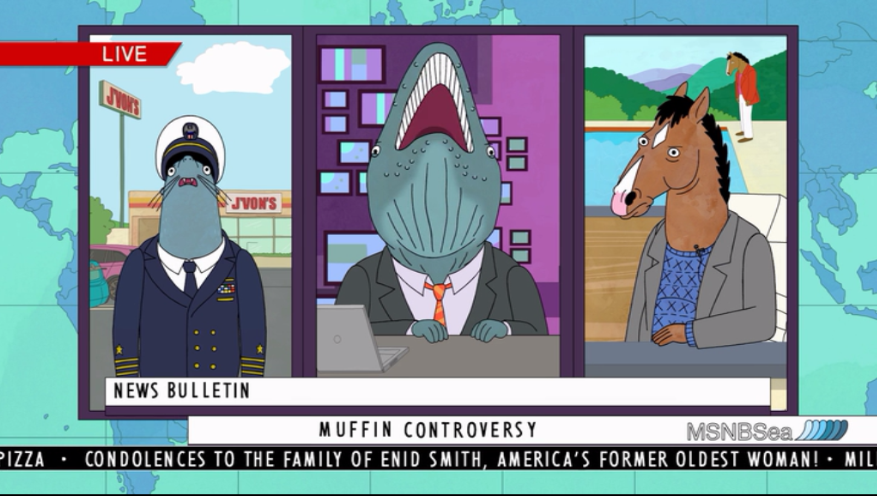
“There is nothing the least bit funny about stealing a meal from Neal McBeal the Navy S.E.A.L.”
Haley: Not only is the world-building tremendous, but there’s also a level of continuity that really took me by surprise. This isn’t a sitcom that’s headed for syndication, and it’s to Netflix’s credit that they took advantage of their unique setup to create an animated series that is meant to be viewed in order. Small moments are planted early on that don’t come together until episodes later. Jokes that seem like one-offs are often the tip of the iceberg to a greater plot line. That doesn’t mean there aren’t plenty of small gags that get their callbacks–the show’s obsession with David Boreanaz, for example, or hatred for Buzzfeed.
Christina: I started loving this show the second they started bullying Buzzfeed. I think that sentence is an exact sentence I messaged you, actually. Buzzfeed might be an easy target, but they’re a truly problematic part of internet reporting and contemporary pop culture in general, and BoJack Horseman’s ability and willingness to go after them was a hint that they were capable of deeper thinking. It was refreshing and gathered enough good will from me to keep watching, and I’m so glad that I did because this show is so much more than anthropomorphic animals riffing about how shitty Hollywood is.
SPOILERS BEGIN HERE.
Haley: So let’s get into what made this show great, because honestly it was. For me, the real moment that solidified BoJack Horseman as Something Different was in Episode 8, “The Telescope,” when BoJack pays a visit to his old friend and business partner, Herb Kazazz. BoJack’s broken relationship with Herb has been hinted at throughout the show so far, and we learned early on that Herb has cancer. Although we’d seen Herb briefly in flashbacks, we’d never met him, and the man we meet looks nothing like the pudgy, bearded Herb that BoJack remembers. He is dying of cancer, not cartoon dying, but truly dying. And when BoJack tries to apologize to Herb for the wrongs he’d done him twenty years earlier, Herb will have none of it: “I’m not going to give you closure…You have to live with the shitty things you did for the rest of your life. You have to know that it’s never, ever going to be okay. I’m dying, and I’m not going to feel better, and I’m not going to be your prop so that you can feel better….I will never forgive you. Get the fuck out of my house.” And that’s it. We don’t see Herb again. The episode ends with BoJack alone, unforgiven, unforgivable. It’s frankly the most powerful, raw scene I’ve ever seen animated.
Christina: It does nothing to make the audience less uncomfortable; there’s no joking here, no gag to break the tension. Afterwards, desperate for some comfort and acting on feelings he’d been hiding, BoJack tries to kiss Diane, and she rejects him, creating a new, awkward status quo that lasts for the rest of the show. Their relationship goes from a close friendship to two people who can’t really be in the same room together, and while BoJack spends a few episodes either trying to win her over or breaking up her engagement to Mr. Peanutbutter, he doesn’t get the girl in the end. Diane marries Mr. Peanutbutter, and her relationship with BoJack is never the same again, not really. Episode eight is a real turning point in the series, and while there’s still a lot of comedy (and the humor lands more consistently), it’s the sadder, more dramatic elements that really make this show great. A lesser show would have undone all of these changes and character developments and returned everything to how it was at the beginning.
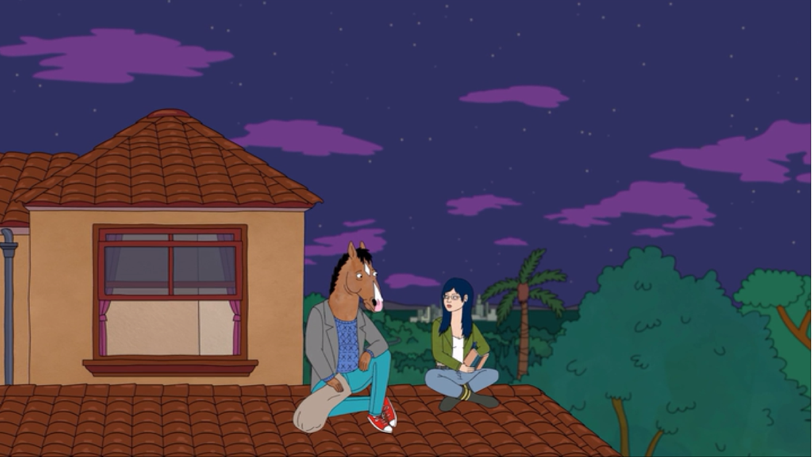
Haley: In the penultimate episode, BoJack, in a desperate attempt to reclaim control of his autobiography, takes a bucketload of drugs and embarks on easily the most insane Drug Tripping Sequence I’ve ever seen. Lasting a full ten minutes, the scene is in turns grotesque, gripping, heartbreaking, and terrifying. It goes beyond all drug-hallucination-tropes and takes the audience to an emotional place that is staggering in its effectiveness. I was left breathless and awed.
Christina: It was the perfect way for the show to begin wrapping up its major themes and a perfect vehicle to get the audience where we needed to be emotionally for the last few minutes of that penultimate episode, appropriately titled “Downer Ending.” How else would BoJack be able to do some serious introspection? Well, drugs, of course. I actually found myself tearing up during the drug trip scene, as BoJack hallucinates what his life would have been like, if he’d only left Hollywood before getting famous. It’s a beautiful other life, filled with time spent with his imagined wife and daughter, and it shows just how lonely and unsteady BoJack is in his real life.
Haley: The show managed to transition from surface comedy into a thoughtful, melancholic meditation on some of life’s deepest questions: What makes a good person? Are we defined by what we believe or by what we do? And in this big, careless world, how do we make ourselves a little less alone? These questions–and the depression it reflects–are handled with such grace and sincerity that when the Rolling Stones’ “Wild Horses” plays over a montage in the finale, it feels anything but ironic. I fucking cried.
Christina: The thesis of this show, or at least the message I took from it, was best said by Diane in the last episode: “Well, that’s the problem with life, right? Either you know what you want and then you don’t get what you want, or you get what you want, and then you don’t know what you want.” BoJack doesn’t know what’s going to make him happy. He gets the best role of his life at the end, playing Secretariat in a film about his idol’s life, he isn’t as alone as he was at the beginning of the show, he’s won a Golden Globe, and his career is back on track. But the last shot we get of BoJack is him gazing out over LA, holding his Golden Globe and standing where he and Herb Kazzaz stood years earlier when they celebrated their impending celebrity. BoJack Horseman isn’t interested in giving you any answers, and the uncertainty of the ending only reinforces the emotional honesty that is so surprising about this show.
Haley: BoJack Horseman, from beginning to end, was a journey that I never expected. It transcends its genre to become one of the most powerful and wonderful shows of the summer.
Bojack Horseman‘s full first season is available on Netflix.

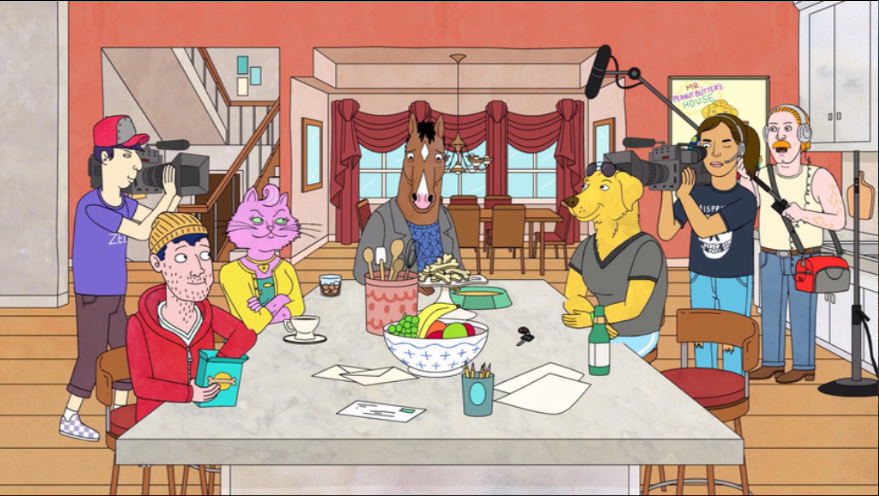
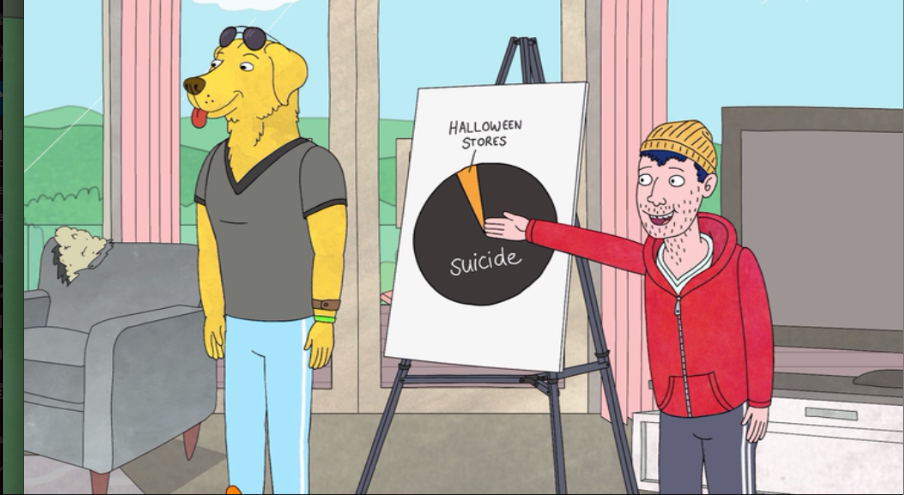
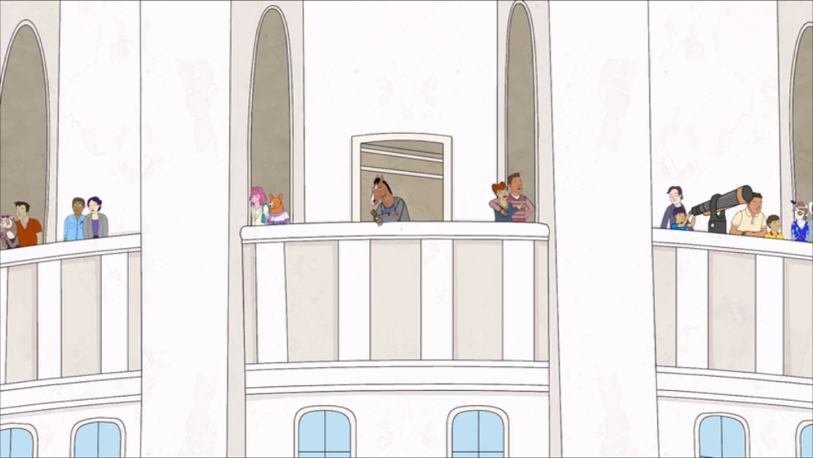

I agree, this show totally took my by surprise. It explores so many powerful themes like regret and missed opportunities, and it does them in a committed way – summarised, I think, by the song at the end of episode 7, where the lyrics are ‘can’t look back – it’s impossible’. By the end of the series I stopped watching for the comedic elements and was instead hooked in by the emotional crescendo that had been building since the end of episode 7. I hope they don’t drop the ball in series 2.